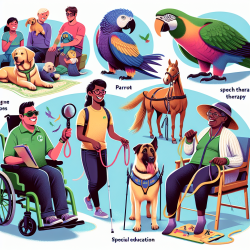In the evolving field of animal-assisted interventions, clear terminology is crucial for practitioners to effectively implement programs and communicate their work. The recent research article, Defining Terms Used for Animals Working in Support Roles for People with Support Needs, offers a comprehensive guide to understanding and utilizing precise definitions for various support roles animals can play.
Here are the key takeaways from the research and how they can be applied to enhance your practice:
1. Understanding Key Definitions
The research identifies nine key terms used to describe animals in support roles:
- Assistance Animal: Trained to perform specific tasks for individuals with disabilities.
- Companion Animal: Pets with no specialized training but can provide emotional benefits.
- Educational/School Support Animal: Animals that work in educational settings to achieve developmental or educational outcomes.
- Emotional Support Animal: Animals that provide emotional support to individuals with disabilities, without needing specific training.
- Facility Animal: Animals trained to work in specific facilities like hospitals or schools.
- Service Animal: Synonymous with Assistance Animal in some regions, trained to perform tasks for individuals with disabilities.
- Skilled Companion Animal: Similar to Assistance Animals but handled by a facilitator rather than the individual with the disability.
- Therapy Animal: Animals incorporated into structured, goal-directed treatments by health professionals.
- Visitation/Visiting Animal: Companion animals trained for public visitation to bring joy and well-being improvements.
2. Implementing the Definitions in Practice
Using these definitions can help practitioners in several ways:
- Clarity in Communication: Clear terminology helps in setting accurate expectations with clients, colleagues, and stakeholders.
- Enhanced Program Design: Understanding the specific roles can guide the design of more effective and targeted intervention programs.
- Legal and Ethical Compliance: Accurate definitions ensure compliance with local laws and ethical standards, especially concerning public access and training requirements.
3. Encouraging Further Research
The article emphasizes the need for ongoing research to refine these definitions and understand their implications globally. Practitioners are encouraged to contribute to this evolving field by:
- Participating in Research: Engage in studies that explore the effectiveness of different animal support roles.
- Sharing Insights: Provide feedback and share experiences to help refine and update the definitions.
- Staying Informed: Keep abreast of the latest research and developments in the field.
To read the original research paper, please follow this link: Defining Terms Used for Animals Working in Support Roles for People with Support Needs.










